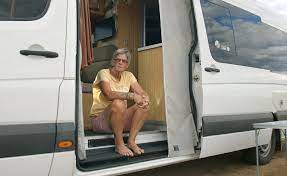UNDER COVER
Australia, 2022, 88 minutes, Colour.
Directed by Sue Thomson.
 No, despite the evocative title, this is not an espionage drama, nor is a story of a police agent embedded in a criminal gang. However, the filmmakers do have a point in calling this film Under Cover even though it is about homeless women in Australia. The narrative makes the point that many of these women try to avoid being in the public eye in their homelessness, that they provide for themselves, despite the deprivations, under cover.
No, despite the evocative title, this is not an espionage drama, nor is a story of a police agent embedded in a criminal gang. However, the filmmakers do have a point in calling this film Under Cover even though it is about homeless women in Australia. The narrative makes the point that many of these women try to avoid being in the public eye in their homelessness, that they provide for themselves, despite the deprivations, under cover.
It comes as something of a surprise, no, even as a shock, to be informed that the growing number of homeless people in Australia are women over the age of 50. Most audiences, city audiences, have become used to seeing people sleeping out on the streets, but they have been men. Now we are informed, and are shown, a group of homeless women.
Documentary maker Sue Thomson has a sympathy for her range of women. And this is reinforced by the rather quiet narrative voice-over by actress, Margot Robbie.
In one sense, once we realise what the topic is, the structure of the film is as expected. But, the range of characters mean that we have to expect the unexpected. 10 women have been chosen for the film, all over 50, all having the experience of homelessness, telling the story of how they had to deal with it, some failures, some success.
For those wondering whether they should see Under Cover, particularly recommended is the two-minute trailer available on YouTube, a brief and very telling introduction to the range of women.
Particularly striking is First Nations author, Claire G Colman, her story, her writings, addressing women’s groups, a strong voice. Then there is the elderly lady who found herself without a home at the age of 84, the camera keeping company with her, going for walks, listening to her, and her philosophy of not complaining but that life must go on. There is a German migrant, cut off from her family at home, living in her car for three years. There are issues of mental health, bipolar. There are women whose marriages fail, who have no career to fall back on, and who, suddenly and without anticipation, find themselves stranded and homeless. Some have accommodated to life and have set up a van, their home rather than a house (as we saw very vividly with Frances McDormand’s character, Fern, in Nomadland.). In fact, quite number of the women have to rely on their cars, not just for transport, but for living in.
There is a matter of factness about the way the women speak about their lives, the sudden shocks of homelessness, the hardships, financial difficulties, finding ways to cope.
It is documentaries like this that contribute to a challenge to our awareness of social justice in Australia – especially social justice, equality, for women, as here, especially over the age of 50.